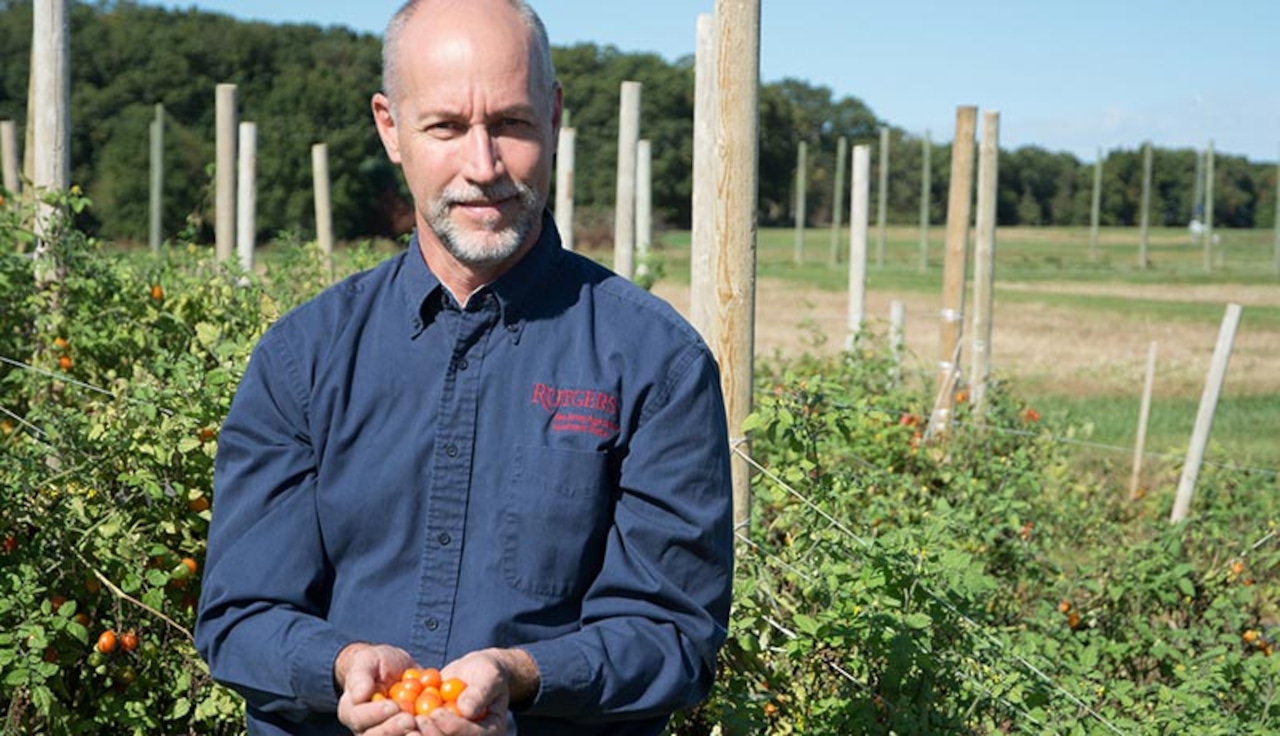Countless iconic things come to mind when you think of New Jersey. From the Jersey shore to Wawa, The Sopranos to Bruce Springsteen, the list goes on and on. One of the most notable on the list has to be the fresh and juicy Jersey tomato.
As one of the leading producers of the fruit in the country, we have to stay competitive. Two Rutgers University researchers took on the challenge, and are ready to introduce the Scarlet Sunrise, a unique bicolor grape tomato.
Peter Nitzsche and Tom Orton have been developing Scarlet Sunrise since 2012, according to Rutgers. The tomato is described as sweet in flavor and crack resistant, with a golden and red hue.
Nitzsche is an associate professor and agricultural agent for Rutgers Cooperative Extension, and director of the Clifford E. and Melda C. Snyder Research and Extension Farm in Pittstown. He found his passion for vegetation after taking a botany course at Rutgers. During his Master’s program he focused on sweet bell peppers and tomatoes. Orton is an emeritus professor of plant biology whose primary focus is in tomato and pepper genetics and breeding to enhance quality.
The two used traditional methods to breed a commercial red grape tomato with a bicolor cherry tomato. Nitzsche and Orton wanted to combine the best traits from both strains, a process that proved to be difficult. They used backcrossing, a breeding technique used to achieve specific traits, to develop the sunrise hues they envisioned.
“There were times we thought it wouldn’t work. Everything was red. No bicolor. That’s when you get frustrated,” said Nitzsche in a press release from the university.
Orton used a small pair of tweezers to extract parts from plants to prevent self-pollination, and used tiny paint brushes to transfer pollen from one plant to another.
“It’s hard to crossbreed grape tomatoes because their flowers are tiny and fragile,” said Orton in a press release.
Scarlet Sunrise had an initial release date in 2020, which was squashed by the Covid-19 pandemic. Rutgers is currently looking for seed partnerships with commercial growers, which would introduce Scarlet Sunrise to a wider audience.
The Rutgers Cooperative Extension, or Vegetable Working Group, is a collaborative effort with the Department of Agriculture. They conduct research and create educational materials on vegetable growing and have an outreach program with commercial growers.
“We’ve always tried to focus on flavor as the competitive advantage for New Jersey growers,” Nitzsche said. “It doesn’t have to be perfect-looking. It just has to taste great.”
Researchers from Rutgers have introduced other varieties of tomatoes in the past, like the Ramapo tomato in 2008 and the Rutgers 250 tomato in 2015. The Ramapo tomato seeds were “resurrected” after commercial farmers stopped buying them because they grew the best mainly along the East Coast, according to an article from NJ Advance Media. The Rutgers 250 tomato was developed to be grown locally and eaten right away, not necessarily for commercial growth.
 Peter Nitzsche holding the Scarlet Sunrise tomatoes.Courtesy of Rutgers University
Peter Nitzsche holding the Scarlet Sunrise tomatoes.Courtesy of Rutgers University
Annually, N.J. is in the top 10 producers of tomatoes in the country and had a production value of over $36 million for the fruit alone in 2023.
The plant will be featured at the university’s Open House and Tomato Tasting event on Aug. 27 at the Snyder Research and Extension Farm.
Currently the Scarlet Sunrise plant grows to be six to eight feet tall. Nitzsche and Orton are trying to correct this so the plant can be more manageable for farmers and gardeners.
“We’re always trying to improve. That’s what science is about,” said Nitzsche.
Our journalism needs your support. Please subscribe today to NJ.com.
Paige Britt may be reached at pbritt@njadvancemedia.com.
If you purchase a product or register for an account through a link on our site, we may receive compensation. By using this site, you consent to our User Agreement and agree that your clicks, interactions, and personal information may be collected, recorded, and/or stored by us and social media and other third-party partners in accordance with our Privacy Policy.


Dining and Cooking